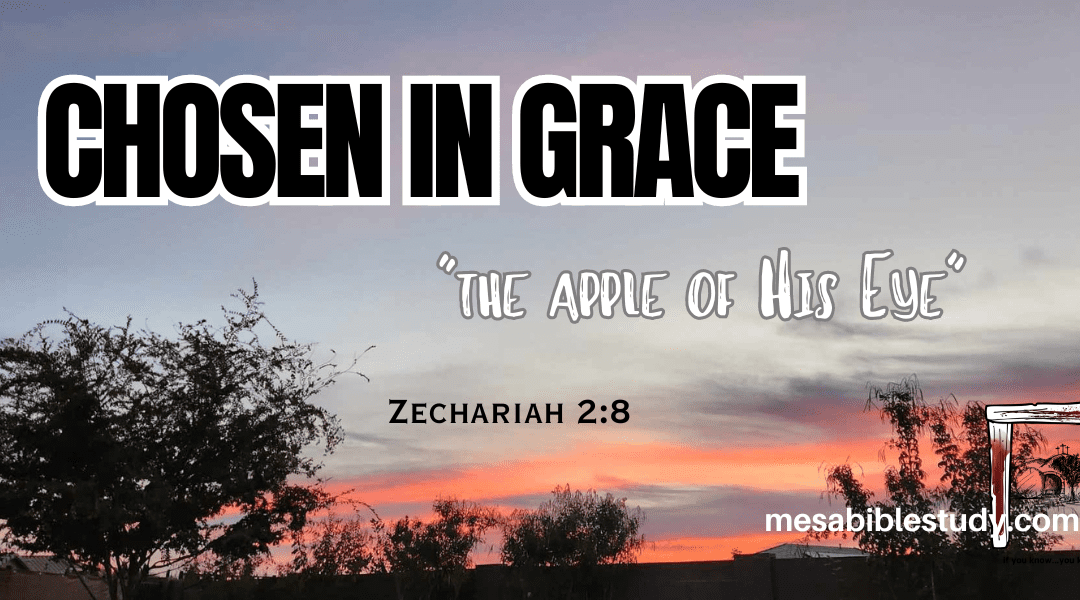
by Jamie Pantastico | Nov 14, 2023 | Israel and Bible Prophecy |
Verse of the Day: Zechariah 2:8
For thus saith the LORD of hosts; After the glory hath he sent me unto the nations which spoiled you: for he that toucheth you toucheth the apple of his eye.
In today’s devotional, we’ll delve into Zechariah 2:8 and explore how this Old Testament passage, directed to Israel, holds a far-reaching message for believers in the age of grace. While God’s covenant promises to Abraham, Isaac, and Jacob were specific to the nation of Israel (and still are), we, as members of the body of Christ, can find encouragement and deeper understanding in this verse.
1. Chosen in Grace
In Zechariah 2:8, God speaks to His chosen people, Israel, addressing them as the “apple of His eye.” Consider the tenderness of this analogy. The Lord describes His people as the “apple of His eye,” highlighting their preciousness. Like the eye, which is delicate and vital, God’s chosen ones (Israel under covenants and the Church under grace) hold a special place in His heart. Harming them is akin to touching the very core of God’s heart.
As believers living in the age of grace, we must recognize that God’s love for His chosen people has not diminished. However, there is an essential distinction between Israel and the Church. While Israel has its unique and special place in God’s plan, grace-age believers are also chosen. Ephesians 1:4 tells us, “According as he hath chosen us in him before the foundation of the world, that we should be holy and without blame before him in love.” We, too, are chosen by God, not based on lineage or ethnicity but by His grace. Amen!
2. The Church: The Body of Christ
God’s message to Israel in Zechariah 2:8 emphasizes their significance and protection under covenants (promises) God made to Israel, but in the age of grace, believers, as the Church, are part of the body of Christ. In 1 Corinthians 12:27, we read, “Now ye are the body of Christ and members in particular.” Just as Israel was set apart in the Old Testament, we (both Jews and Gentiles) are set apart as members of the Church (the body of Christ), connected to Christ as the head of the body.
3. Law vs. Grace
Zechariah 2:8 reflects the covenant promises made to Israel, beginning with the Abrahamic covenant in Genesis 12:3. However, we, as grace-age believers, are not under the same covenant. We are under the age of grace, that is, salvation is for both Jew and Gentile by grace through faith in the finished work of the cross alone, apart from the Mosaic law, temple worship, or any ritual or works (1 Corinthians 15:1-4; Romans 3:21). This distinction between the law and grace is vital for us to understand, as it sets the foundation for our faith today.
4. The Unchanging Love of God
While the application of Zechariah 2:8 differs between Israel and the Church, one constant remains: the unchanging love of God. In both cases, God’s love for those who love Him endures. Romans 8:38–39 beautifully reaffirms this truth: “For I am persuaded that neither death nor life, nor angels nor principalities nor powers, nor things present nor things to come, nor height nor depth, nor any other creature, shall be able to separate us from the love of God, which is in Christ Jesus our Lord.”
As we reflect on Zechariah 2:8, let us be encouraged by the fact that we, as believers in this age of grace, are also chosen by God by His grace. We are part of the body of Christ, recipients of His grace, and heirs to the promise of eternal life. Let us embrace this distinction between Israel and the Church, understanding our unique place in God’s plan, and may we continue to rest in the unchanging love of our heavenly Father.
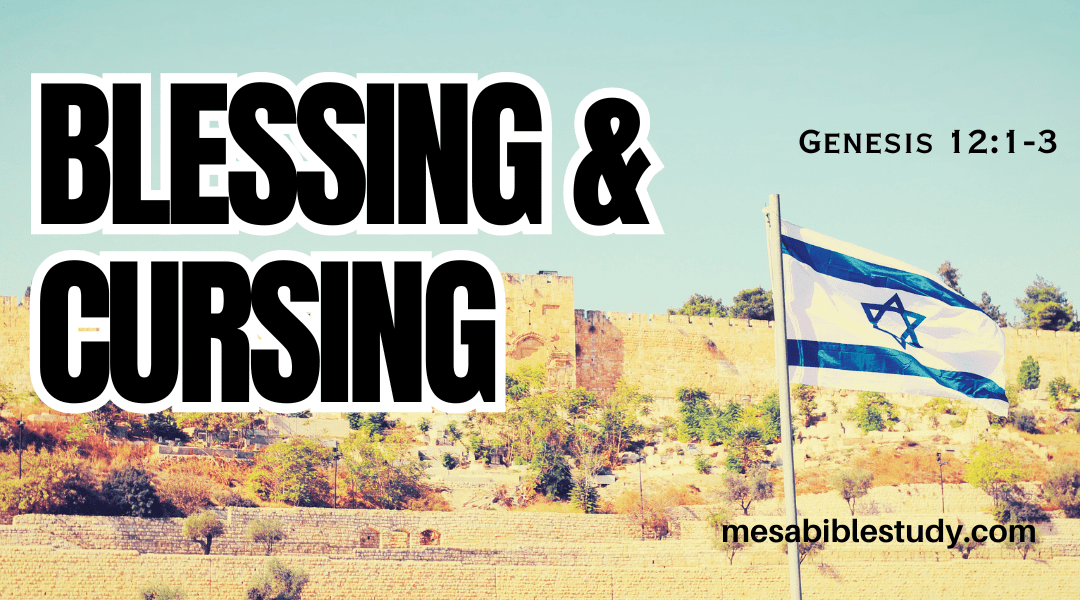
by Jamie Pantastico | Nov 7, 2023 | Daily Encouragement |
Introduction
‘Now the Lord had said to Abram: “Get out of your country, From your family And from your father’s house, To a land that I will show you. I will make you a great nation; I will bless you And make your name great; And you shall be a blessing. I will bless those who bless you, And I will curse him who curses you; And in you all the families of the earth shall be blessed.”’
Genesis 12:1-3
In Genesis 12:1–3, the foundational covenant between God and Abraham unfolds, setting the stage for an unbroken promise that spans all of the Old Testament and into eternity. Genesis 12:1–3 introduces us to the Abrahamic Covenant, a promise from God that remains profoundly relevant today. While these verses reveal many facets of God’s commitment to Abraham and his descendants, we will focus on the key element expressed in the first part of verse three: “I will bless those who bless you, and I will curse him who curses you.”
The Eternal Abrahamic Covenant
The Abrahamic Covenant, initiated in Genesis, is an eternal covenant established by God. It is a divine promise to bless not only Abraham but his descendants as well (the Jewish people). While this covenant included promises of land and countless descendants, Abraham would become a great nation, and through Abraham would all the nations be blessed, which is a reference to Jesus Christ, it also contained the promise of blessing and cursing.
The Blessing of Blessing
‘I will bless those who bless you, And I will curse him who curses you; And in you all the families of the earth shall be blessed.”’
Genesis 12:3
The promise articulated in Genesis 12:3 is clear: those who bless Abraham’s descendants (from Isaac and Jacob) are themselves blessed. This promise is not time-bound but extends into eternity. God’s blessings flow to individuals, nations, and leaders who stand in support of the nation of Israel. By doing so, they align themselves with the divine purpose and will of God.
The Warning of Cursing
In contrast, the warning is equally explicit: those who curse or oppose Abraham’s descendants (Isaac and Jacob) invite God’s curse upon themselves. The consequences are severe, as God remains steadfast in upholding His covenant. When individuals, nations, or powers oppose the nation of Israel, they find themselves at odds with God’s ordained plan. This warning should serve as a stark reminder to those who would harm or undermine God’s chosen people.
An Ongoing Obligation
This divine promise endures. Today, as in centuries past, believers and the world at large have an obligation. We are called to pray for the nation of Israel and her people. We are not to look down on them but rather to recognize their unique position as God’s chosen people. God has made promises to the Jewish people (a King and a glorious kingdom), and He will unfailingly fulfill them. No earthly power, no human leader, no nation, not even Satan, can hinder the divine plan that God set in motion with Abraham.
Conclusion
The Abrahamic Covenant remains in effect today and beyond. God’s promise of blessing those who bless Israel and cursing those who curse her is unwavering. As believers, we must embrace this truth by faith, not only in our theology but in our daily lives.
Let us fervently pray for the nation of Israel and her people, for in doing so, we align ourselves with God’s eternal purposes and His eternal covenant with Abraham. In this, we find not only a divine promise but also a profound opportunity to participate and be in God’s will.
Here are seven Bible passages that underscore the importance of praying for God’s chosen people:
‘For I do not desire, brethren, that you should be ignorant of this mystery, lest you should be wise in your own opinion, that blindness in part has happened to Israel until the fullness of the Gentiles has come in. ‘
Romans 11:25
‘When the Most High divided to the nations their inheritance, When he separated the sons of Adam, He set the bounds of the people According to the number of the children of Israel. ‘
Deuteronomy 32:8
1. Psalm 122:6: “Pray for the peace of Jerusalem: ‘May they prosper who love you.'”
2. Romans 10:1 (NKJV): “Brethren, my heart’s desire and prayer to God for Israel is that they may be saved.”
3. Genesis 12:3 (NKJV): “I will bless those who bless you, and I will curse him who curses you; and in you all the families of the earth shall be blessed.”
4. Jeremiah 29:7 (NKJV): “And seek the peace of the city where I have caused you to be carried away captive, and pray to the Lord for it; for in its peace you will have peace.”
5. Isaiah 62:6 (NKJV): “I have set watchmen on your walls, O Jerusalem; they shall never hold their peace day or night. You who make mention of the Lord, do not keep silent.”
6. Zechariah 2:12 (NKJV): “And the Lord will take possession of Judah as His inheritance in the Holy Land, and will again choose Jerusalem.”
7. 1 Timothy 2:1-2 (NKJV): “Therefore I exhort first of all that supplications, prayers, intercessions, and giving of thanks be made for all men, for kings and all who are in authority, that we may lead a quiet and peaceable life in all godliness and reverence.”
These verses emphasize the importance of praying for God’s chosen people and for the peace and salvation of Jerusalem. Believers are encouraged to intercede for Israel’s well-being and the fulfillment of God’s purposes.
Prophecy Fulfilled Deuteronomy 30:1 and 2 “Amazing”

by Jamie Pantastico | Nov 6, 2023 | Daily Encouragement |
Replacement theology, Amillennialism, and covenant theology are each cut from the same fleshly cloth drawn from man’s theology governing Scripture when it is God’s Word alone that reigns over theology.
This doctrine asserts that the Church has replaced Israel in God’s plan of the ages. Many mainstream Protestant denominations adhere to this view, a theology born from early Church fathers who struggled (lack of faith) to reconcile Israel’s history of rebellion with God’s enduring promises.
Adherents of this belief system often twist Scripture, using a flawed method of interpretation that sidelines God’s chosen people in prophecy. This leads to egregious misinterpretations of key passages, such as Romans 9–11, Matthew 12:48–50, Galatians 3:29, Matthew 3:9, and Romans 2:28–29.
This doctrine of demons implies that God would renege on His covenant with Abraham, Isaac, Jacob, and King David, abandoning the Jewish people and the promises made to them. Such a notion undermines God’s faithfulness and truthfulness, which are unimpeachable.
In truth, God’s promises to Israel remain steadfast, as He is eternally faithful to His chosen people.
Recommended Reading:
God’s Promises to Israel are Everlasting
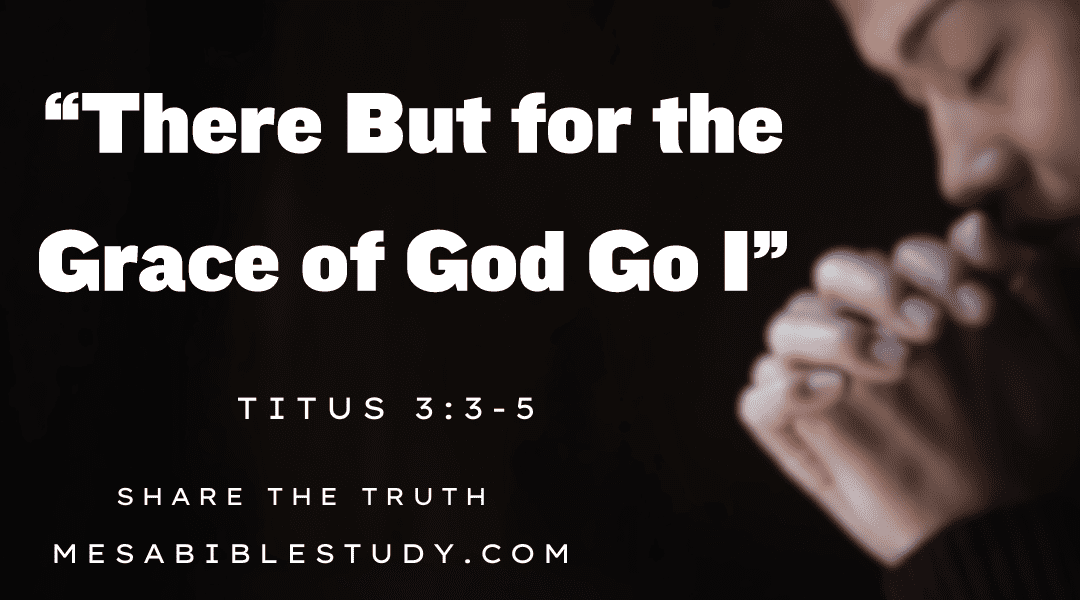
by Jamie Pantastico | Nov 5, 2023 | Daily Encouragement |
‘For we ourselves were also once foolish, disobedient, deceived, serving various lusts and pleasures, living in malice and envy, hateful and hating one another. But when the kindness and the love of God our Savior toward man appeared, not by works of righteousness which we have done, but according to His mercy He saved us, through the washing of regeneration and renewing of the Holy Spirit, ‘
Titus 3:3-5
Introduction
In Titus 3:3-5, the apostle Paul illustrates a stark contrast between the former (before a believer believed the gospel) condition of believers and the transformation brought about by the power of the gospel. These passages emphasize that salvation comes solely by grace through faith in the gospel alone and not by any human work.
1. The Past State: Slaves of Sin (Verse 3):
In verse 3, Paul describes the believers’ condition before their encounter with the gospel: “For we ourselves were also once foolish, disobedient, deceived, serving various lusts and pleasures, living in malice and envy, hateful and hating one another.”
This verse serves as a stark reminder of the fallen state of humanity. It illustrates that believers were once slaves of sin in the kingdom of darkness (Colossians 1:13), displaying disobedience, foolishness, and animosity toward others. This fallen, Adamic nature is universal (Romans 3:23) and true for every believer.
2. The Message of Grace: “The Cross” (Verse 4):
The transition to verse 4 is a powerful shift in the narrative: “But when the kindness and the love of God, our Savior, toward man appeared,”
Here, the Apostle Paul is referring to the finished work of the cross and introducing the pivotal moment of salvation. He speaks of the kindness and love of God, which is a reference to God’s mercy and grace. It emphasizes that God initiated salvation not based on human merit but because of His great mercy and love (Ephesians 2:4).
3. Salvation by Grace through Faith Alone (Verse 5):
Verse 5 further expounds on God’s redemptive act: “not by works of righteousness which we have done, but according to His mercy He saved us, through the washing of regeneration and renewing of the Holy Spirit.”
This verse clearly underscores the core principle that salvation is by grace through faith alone in the gospel. Paul disqualifies any notion that salvation can be achieved through human deeds or “works of righteousness.” Instead, he emphasizes God’s mercy and grace as the sole basis for salvation.
4. The Role of the Holy Spirit (Verse 5, Continued):
The verse proceeds to explain that believers are saved through “the washing of regeneration and renewing of the Holy Spirit.”
This refers to the spiritual transformation that takes place at the moment a lost person believes the gospel. It’s not a result of human effort but a supernatural work of the Holy Spirit that cleanses and renews the believer (2 Corinthians 5:17).
Conclusion:
Titus 3:3-5, within the context of Paul’s message to grace-age believers, beautifully encapsulates the essence of the Christian faith. These passages affirm the fallen state of all believers before salvation and emphasize God’s love, mercy, and grace as the source of salvation. These Bible verses highlight the fundamental doctrine that salvation is by faith alone, not by human works.
Paul’s message underscores that salvation is a free gift, received by grace (unmerited favor) through faith in the finished work of the cross, and we are sealed by the indwelling Holy Spirit (Romans 8:9; Ephesians 1:13).
This passage serves as a reminder that, by the grace of God, we too (believers) would still be slaves to sin in Satan’s slave market. Furthermore, Titus 3:3-5 emphatically states that salvation is a gift of God, and our works can never merit salvation. Rather, it is God’s great mercy, grace, and love, demonstrated through Christ’s atoning work, that justifies believers and secures their eternal hope.
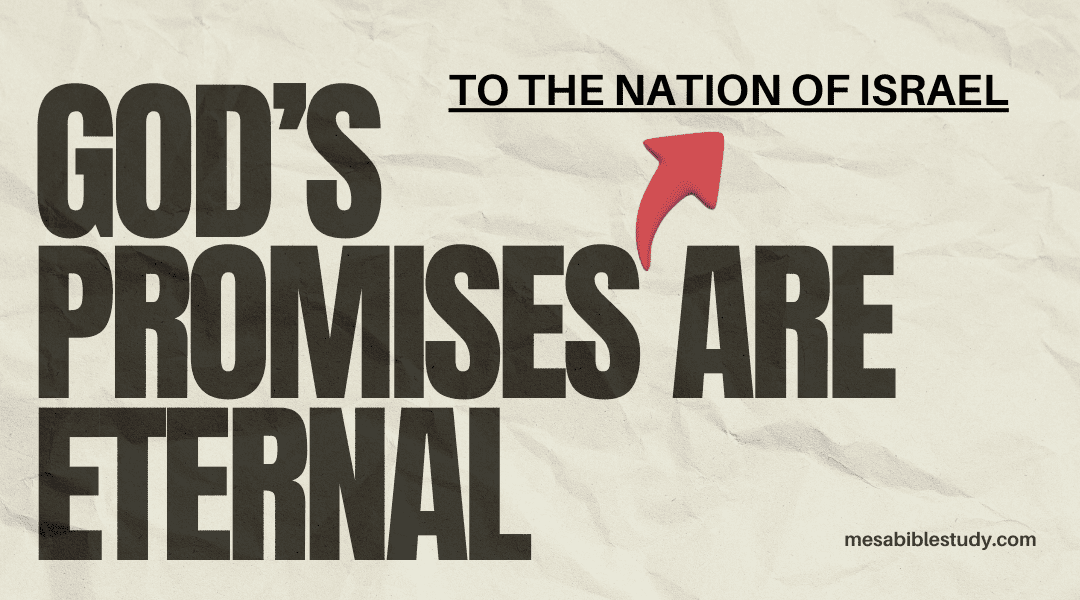
by Jamie Pantastico | Nov 2, 2023 | Daily Encouragement |
God’s promises to the nation of Israel are etched in eternity, a covenant that no act of man or principality can thwart. The God of Abraham, Isaac, and Jacob, unwavering in His faithfulness, cannot break His word. His commitment to Israel transcends human frailty. The promises made are from God to Israel, and God, who is Truth, cannot lie. Regardless of Israel’s actions, the Almighty will uphold His pledge. His covenant stands as an everlasting testament to His boundless love for His chosen people and unwavering sovereignty (Exodus 19:5).
‘Now therefore, if you will indeed obey My voice and keep My covenant, then you shall be a special treasure to Me above all people; for all the earth is Mine. ‘
Exodus 19:5
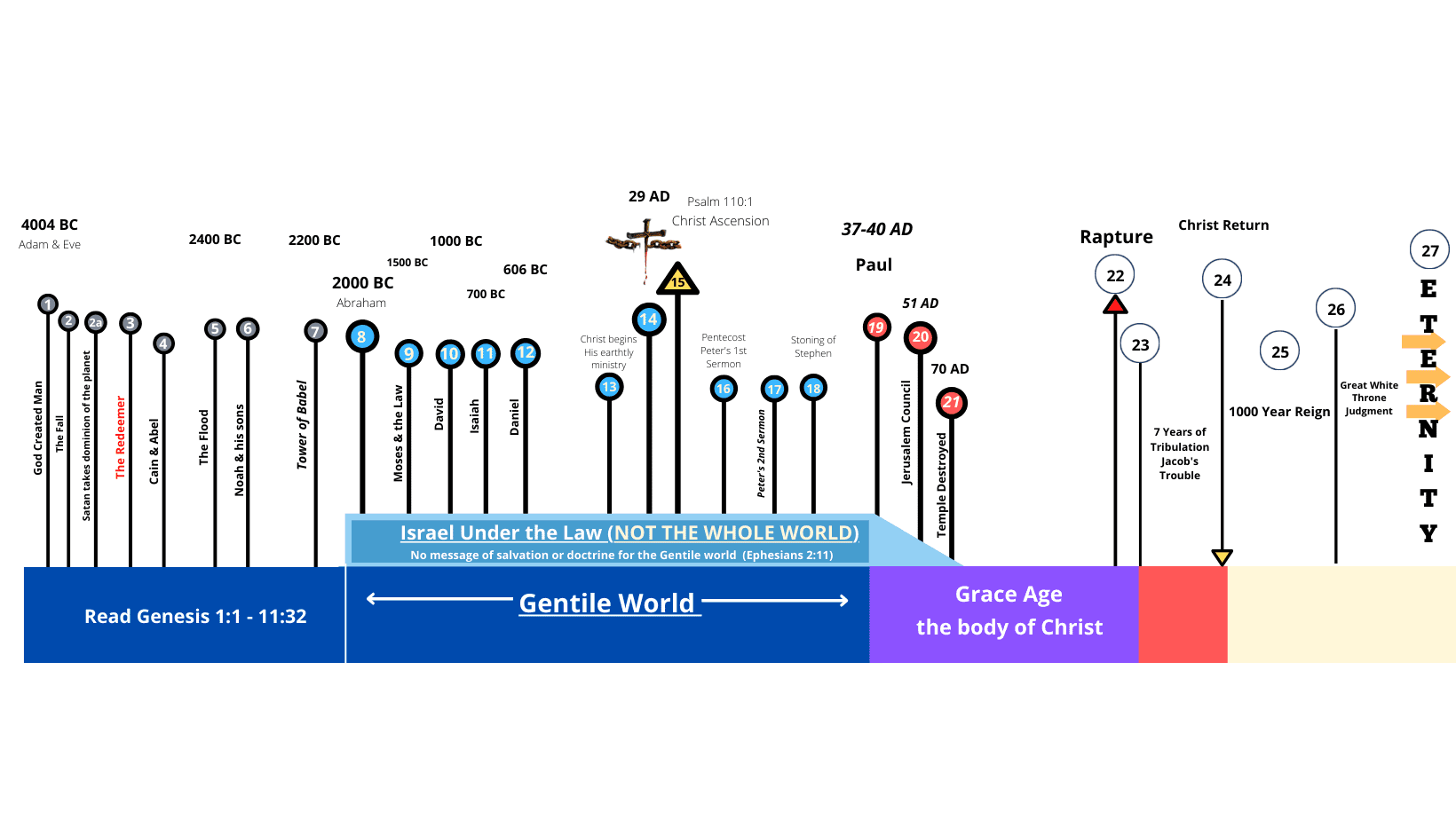
Here are 10 Bible passages from the Old Testament that emphasize God’s unwavering commitment to His chosen people, the Jewish people, and the nation of Israel:
- Genesis 17:7
“And I will establish my covenant between me and thee and thy seed after thee in their generations for an everlasting covenant, to be a God unto thee, and to thy seed after thee.”
- Genesis 17:19
“And God said, Sarah thy wife shall bear thee a son indeed, and thou shalt call his name Isaac: and I will establish my covenant with him for an everlasting covenant, and with his seed after him.”
- 2 Samuel 7:16
“And thine house and thy kingdom shall be established forever before thee: thy throne shall be established forever.”
- 2 Samuel 23:5
“Although my house be not so with God; yet he hath made with me an everlasting covenant, ordered in all things, and sure: for this is all my salvation, and all my desire, although he make it not to grow.”
- Jeremiah 31:35-36
“Thus saith the Lord, which giveth the sun for a light by day, and the ordinances of the moon and of the stars for a light by night, which divideth the sea when the waves thereof roar; The Lord of hosts is his name: If those ordinances depart from before me, saith the Lord, then the seed of Israel also shall cease from being a nation before me forever.”
- Jeremiah 33:20
“Thus saith the Lord; If ye can break my covenant of the day, and my covenant of the night, and that there should not be day and night in their season;”
- Psalm 89:34-37
“My covenant will I not break, nor alter the thing that is gone out of my lips. Once have I sworn by my holiness that I will not lie unto David. His seed shall endure forever, and his throne as the sun before me. It shall be established forever as the moon, and as a faithful witness in heaven. Selah.”
- Isaiah 54:10
“For the mountains shall depart, and the hills be removed; but my kindness shall not depart from thee, neither shall the covenant of my peace be removed, saith the Lord that hath mercy on thee.”
- Ezekiel 37:26
“Moreover I will make a covenant of peace with them; it shall be an everlasting covenant with them: and I will place them, and multiply them, and will set my sanctuary in the midst of them forevermore.”
- Amos 9:15
“And I will plant them upon their land, and they shall no more be pulled up out of their land which I have given them, saith the Lord thy God.”
Recommended reading:
The Kingdom is the Kingdom is the Kingdom “The Millennial Reign of Christ”
#GodsPromise #EverlastingCovenant #Israel”





